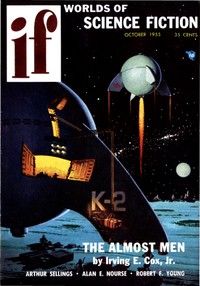The Almost-Men by Irving E. Cox
"The Almost-Men" by Irving E. Cox, Jr. is a science fiction novel written in the mid-20th century. Set in a post-apocalyptic world where humanity is subjugated by technologically superior invaders known as the Almost-men, the story explores themes of resilience, identity, and the potential for human adaptation. The narrative unfolds against a backdrop of warfare, survival, and ideological conflict, centering around the struggle of a group of surviving humans determined to reclaim
their freedom. The plot follows Lanny and Gill, two brothers navigating a world dominated by the Almost-men, who use advanced technology to maintain control over the remnants of mankind. The brothers' journey leads them to confront the moral complexities of resistance as they grapple with the past and their identities. Alongside their father, Juan Pendillo, and Tak Laleen, a missionary from the enemy camp, they travel through treacherous territories, confronting both external threats and the internalized despair brought about by defeat. As the tension escalates, Lanny uncovers the extraordinary capabilities of the human mind, revealing that defeat is only a state of belief. The story culminates in a profound realization that true liberation comes from within, redefining what it means to be human in a world of machines. Ultimately, the novel advocates for the emancipatory power of rational thought and the importance of self-discovery in the face of oppression. (This is an automatically generated summary.)
Read or download for free
| How to read | Url | Size | |||
|---|---|---|---|---|---|
| Read now! | https://www.gutenberg.org/ebooks/59356.html.images | 125 kB | |||
| EPUB3 (E-readers incl. Send-to-Kindle) | https://www.gutenberg.org/ebooks/59356.epub3.images | 345 kB | |||
| EPUB (older E-readers) | https://www.gutenberg.org/ebooks/59356.epub.images | 346 kB | |||
| EPUB (no images, older E-readers) | https://www.gutenberg.org/ebooks/59356.epub.noimages | 109 kB | |||
| Kindle | https://www.gutenberg.org/ebooks/59356.kf8.images | 400 kB | |||
| older Kindles | https://www.gutenberg.org/ebooks/59356.kindle.images | 392 kB | |||
| Plain Text UTF-8 | https://www.gutenberg.org/ebooks/59356.txt.utf-8 | 117 kB | |||
| Download HTML (zip) | https://www.gutenberg.org/cache/epub/59356/pg59356-h.zip | 587 kB | |||
| There may be more files related to this item. | |||||
Similar Books
About this eBook
| Author | Cox, Irving E., 1917-2001 |
|---|---|
| Title | The Almost-Men |
| Series Title | Produced from Worlds of If Science Fiction, October 1955 |
| Note | Reading ease score: 75.1 (7th grade). Fairly easy to read. |
| Credits |
Produced by Greg Weeks, Mary Meehan and the Online Distributed Proofreading Team at http://www.pgdp.net |
| Language | English |
| LoC Class | PS: Language and Literatures: American and Canadian literature |
| Subject | Science fiction |
| Subject | War stories |
| Subject | Extraterrestrial beings -- Fiction |
| Subject | California -- Fiction |
| Category | Text |
| EBook-No. | 59356 |
| Release Date | Apr 25, 2019 |
| Copyright Status | Public domain in the USA. |
| Downloads | 87 downloads in the last 30 days. |
| Project Gutenberg eBooks are always free! | |

